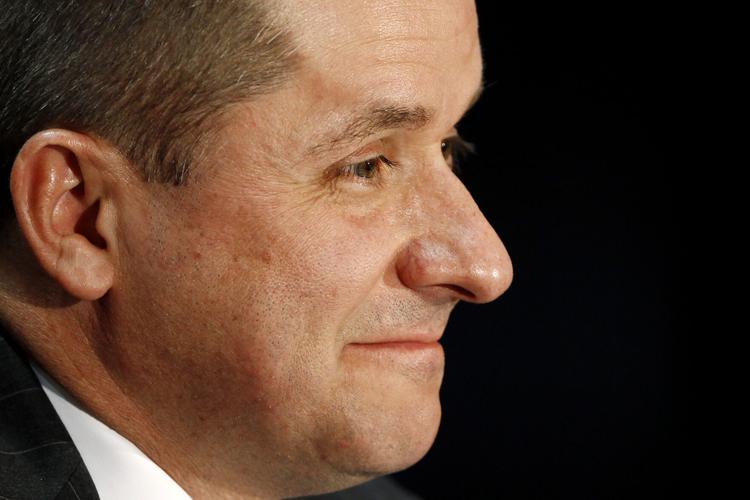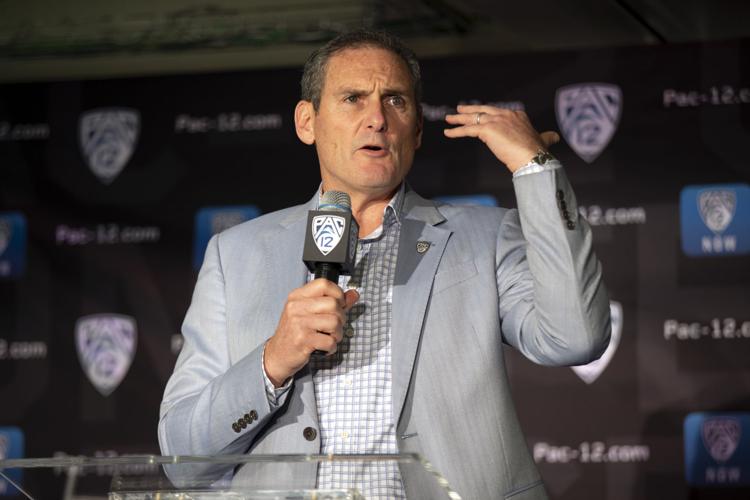The Pac-12’s search for a commissioner is winding down and could be resolved in the next week or 10 days, according to sources familiar with the process.
That timeline corresponds to May 17, the date of a previously scheduled meeting of the presidents/chancellors and “a natural place to have a decision,” a source said.
Dozens of names have surfaced at various stages of the four-month search, including Amy Brooks, the NBA’s Chief Innovation Officer, Randy Freer, the former Fox Sports president, and Oliver Luck, the former West Virginia athletic director and XFL commissioner.
However, we’re unable to confirm the identity of any candidates who have interviewed in front of all 12 presidents and chancellors — or if that step is even underway.
(Brooks told the Sports Business Journal recently that she is not a candidate.)
As the presidents and TurnkeyZRG churn forward under a cone of silence, three things are clear:
1. The presidents have not attained consensus about the future direction of the conference or the role of the commissioner position.
“Alignment has been a challenge,” a source said.
Some presidents are believed to favor candidates with campus experience; other presidents are said to prefer candidates from professional sports or the sports media world.
“No matter who you pick,” another source said, “there’s going to be resistance because there are two factions.”
2. The conference, with Turnkey running point, cast the widest possible net — not only in terms of professional experience but also personal backgrounds.
“There has been a definite preference to finding diverse candidates,” a source said, “and that’s exactly what they should be doing.”
3. So deep is the frustration over the current state of affairs that no one associated with commissioner Larry Scott’s tenure has received serious consideration, according to sources.
That includes current and former conference officials and current Pac-12 athletic directors.
The presidents let the situation deteriorate to the point that they’re insistent upon a clean break that naturally limits the pool of qualified candidates.
“How did they let it get to this point?” one source said.
Well, here’s one clue:
There wasn’t even unanimity on the decision to move on from Scott.
Yep, multiple presidents wanted to retain the controversial commissioner, whose contract expires next spring.
“A clear majority were in favor” of moving on, according to a source who declined to name names, “but some were opposed to cutting ties.”
Fans of Pac-12 football and men’s basketball, and perhaps many athletic department officials, might find that difficult to believe.
Although Scott’s tenure flourished initially, a litany of problems in recent years has severely damaged the Pac-12’s brand generally and his brand personally — from the instant-replay debacle in 2018 to his gaudy hotel room in Las Vegas in 2019 and the decision to give performance bonuses last summer, one month before announcing layoffs and furloughs.
But for some presidents and chancellors, the state of Pac-12 athletics and performance of the commissioner are far down the list of priorities.
Had the presidents moved on from Scott earlier, they could have considered hiring Northwestern athletic director Jim Phillips, who has ties to the conference (via Arizona State) and is regarded by many within college sports as one of the top athletic directors in the country.
Phillips would have been a five-star hire by the Pac-12, but the presidents missed their chance by waiting: In December, he was named commissioner of the ACC after a search conducted by the very same firm, Turnkey, that’s leading the Pac-12 process.
“A lot of this is self-inflicted,” a source said.
Turnover at the top has played a central role in the state of affairs.
Only two presidents remain from the group that hired Scott in 2009: UCLA chancellor Gene Block, who has been silent on the state of Pac-12 sports, and Arizona State’s Michael Crow, who has been Scott’s staunchest public supporter over the years.
Of the remaining 10 presidents/chancellors, two are serving as interims (Utah and Oregon State) and seven arrived in the second half of the last decade.
They weren’t in charge during the halcyon days of Scott’s tenure (the addition of Utah and Colorado, the mega-deal with ESPN and Fox, the launch of the Pac-12 Network).
And yet, they delayed a decision on Scott’s future long past the point that college athletic officials, both inside and outside the conference, viewed a change as wholly necessary.
In other words, they didn’t see a need, or feel an urgency, to make a change. Is there any reason to think they will make the right move this time?
Hotline sources believe that for all challenges facing the Pac-12, there are quality candidates available.
Now, it’s all about the presidents.
It’s about settling on the right vision for the conference and agreeing on the proper role of the commissioner.
It’s not about how smart they look; it’s about how smart they hire.
It’s about execution.
Your skepticism is warranted.





